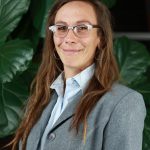Beefing up cattle producers
Nebraska extension educator is inducted as a 2024 member of the Nebraska Hall of Ag Achievement
Nebraska Beef Systems Extension Educator Aaron Berger was inducted last month as a 2024 member of the Nebraska Hall of Agricultural Achievement.
The Kimball, Neb., man was recognized for his work with beef producers across not only the state of Nebraska, but the nation, for “helping ranchers improve profitability,” according to a news release from the University of Nebraska-Lincoln.
He is well-known for his Beef Watch podcasts, of which he posts about twice weekly. In his podcasts, Berger looks at research-based information, “visiting with the researchers themselves or producers who have taken the research and applied it,” he said, “and I think that’s what sets the Beef Watch podcast apart from other podcasts.”
Podcasts are a good fit for ranchers and farmers, he believes, because their free time to learn new information is limited.
“For the clients I work with, their feedback is, ‘Aaron, I don’t have time to sit in the evening and read. But I can listen to your podcasts.”
Berger also posts regularly online, and hosts conferences, Zoom meetings, and meetings with clients one-on-one, at their request.

BRINGING INFO TO PRODUCERS
His goal is to bring information, both new and “evergreen,” to producers.
“My goal as an extension educator is to take educational resources developed by UNL and other land grant universities, and provide those as learning opportunities for Nebraskans, primarily, but also for people in the U.S., and nearly around the world.”
He “takes the research and helps people think through and understand how to apply it,” he said. “It’s putting the knowledge into action and helping people think through their goals, individual scenarios, their resources, and how that information can be used by them to accomplish their goals, whether their goals are financial, stewardship, land management, or personal values they want to see take place.”
Digital information is not the only way Berger shares the information he’s gathered.
He holds several multi-day conferences each year, like a unit cost production workshop he held in the past, with 10 ranchers working on a case study ranch, so they can see how to apply the principles to their own ranches.
He, along with two other presenters, hosted a presentation on the fundamentals of feeding cows, talking about basic nutrition for the cow herd.
Berger also hosts Zoom presentations, making it easier for ranchers to attend from their homes instead of traveling to the class site.

USING TECHNOLOGY
In mid-April, he will facilitate a roundtable called “Technology on the Ranch,” with producers invited who are using technology on their ranches, like using drones, remote water sensors, remote cameras and virtual fencing.
Jonathan Nelson, a rancher with land near Dix, Neb., and Padroni, Colo., has worked with Berger for several years, and speaks highly of him.
“Like any extension guy,” Nelson said, “their job is to be a sounding board, and that’s what he’s been for me, for different ideas I’ve had, to see if my ideas made sense to somebody else. Being an extension guy and part of the university, he has research that I don’t necessarily have at my fingertips.”
Nelson has implemented a couple of things on his ranch that Berger helped with.
“Aaron encouraged me to use remote water sensors and game cameras to keep an eye on my water tanks.” Berger did some research to help Nelson find a good camera company.
But the biggest way Berger helped Nelson was with a suggestion for fall calving. Nelson is a spring calver, selling the open cows in the fall. Berger suggested that Nelson turn a bull out with the open cows before selling them, making them fall calvers and increasing their value.
“Aaron said, ‘why don’t you put a bull in and capture some value in some of your younger animals?” Nelson said.
“That was probably one of the greatest a-ha moments, and it came from him. Every year, I joke with him, saying he needs to start charging commission. That idea was a very good one.”
Berger “is very humble,” Nelson said. “He’s just like, anything to help you. I told him, you did a little bit more than help me. That’s him, listening, and giving me the right application for what I needed.”
INFORMATION VS OPINION
Berger is careful to present the information and not his opinion to a producer.
“I don’t come with a ‘here’s what you should do attitude.’ I come with, here are some options, here’s something to think through, how can I help you get the information you need to accomplish what you want to do?”
“I’m constantly wanting to think about what’s out there, but also to help people think through, is this of value, or should I let this go by? Not everything new should be used.”
Berger grew up on a ranch between North Platte and Stapleton. He graduated from the University of Nebraska-Lincoln in 1998 and from Colorado State University in 2000 with a masters in beef cattle management systems.
He loves helping.
“A part of the reason I’m able to relate well and understand ranchers and their circumstances is because that’s where I really find a lot of joy and pleasure myself. It’s what I envisioned doing. I can understand where they’re at, the issues they’re dealing with, the passions they have for their land, their livestock, and to make a life ranching.”








